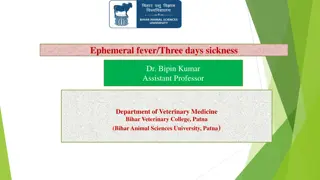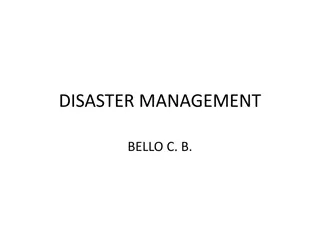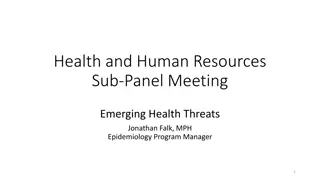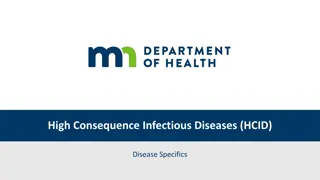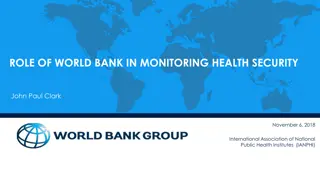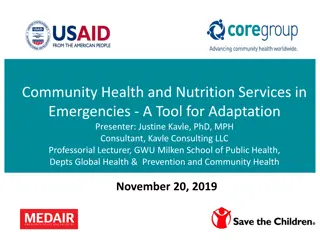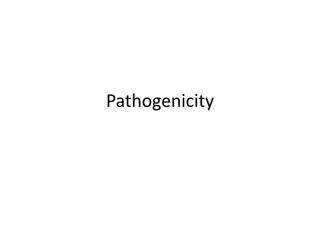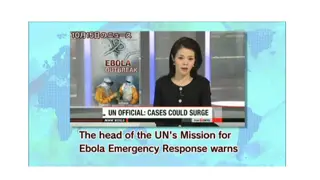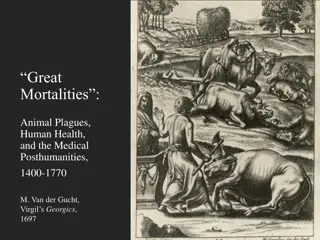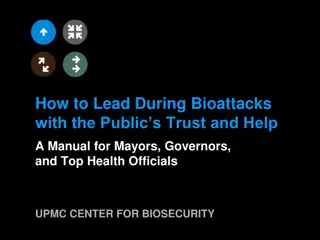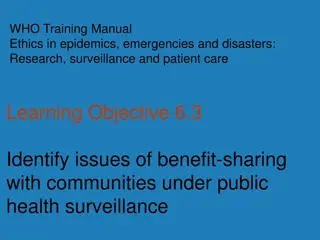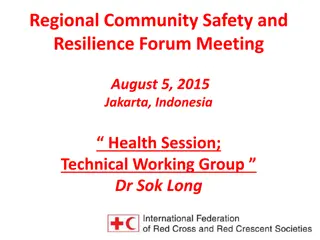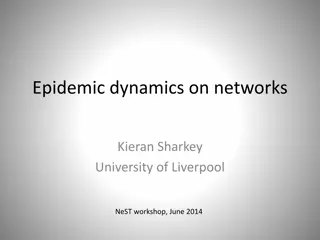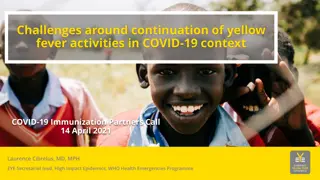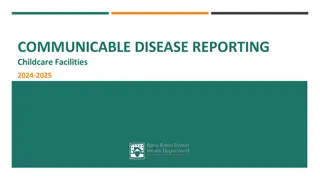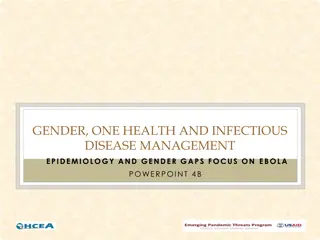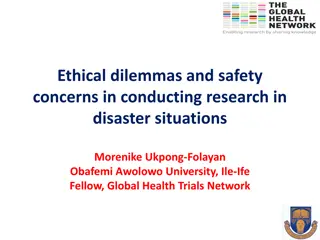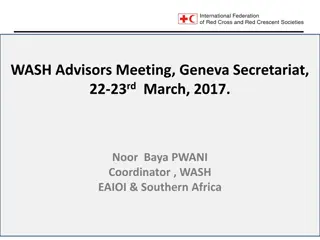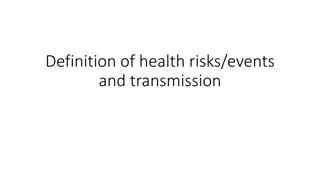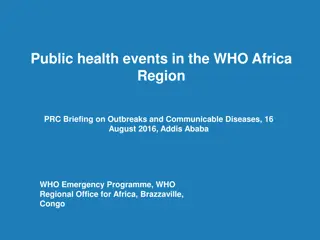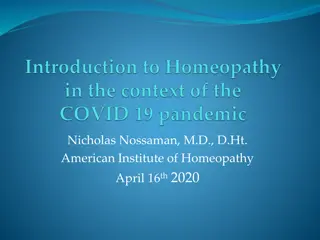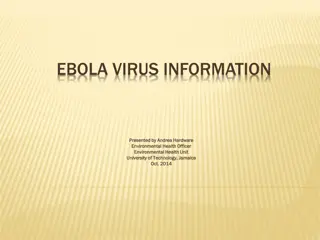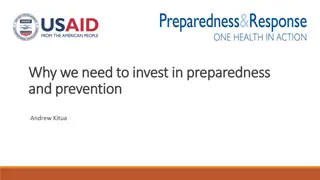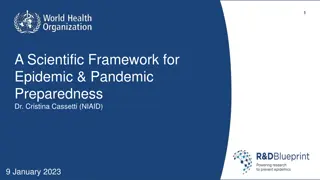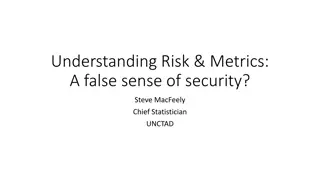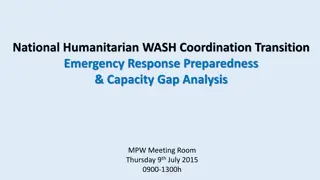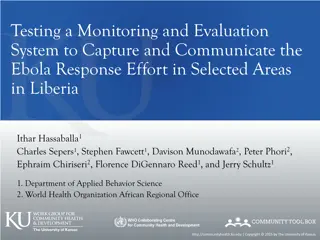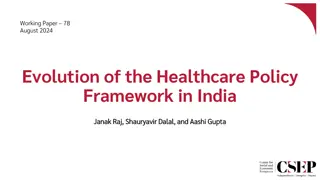Understanding Contact Tracing in Public Health
Contact tracing is a crucial process in public health aimed at identifying and monitoring individuals who have been in close contact with those infected with infectious diseases. It involves tracking and managing potential outbreaks, monitoring symptoms, and preventing further transmission. The hist
1 views • 15 slides
Understanding Ephemeral Fever/Three-Day Sickness in Cattle and Water Buffalo
Ephemeral fever (Three-Day Sickness) is an acute arthropod-borne viral disease affecting cattle and water buffalo. It is caused by the Bovine Ephemeral Fever Virus and manifests with biphasic fever, decreased milk yield, and other clinical signs. The disease has varying prevalence and can lead to hi
0 views • 7 slides
Understanding Disaster Management: Definition, Impact, and Examples
A disaster is any occurrence causing damage, ecological disruption, or loss of life on a scale requiring an extraordinary response. This article explores the definition of disasters, their impact on communities and infrastructure, the importance of emergency response, types of hazards, vulnerability
1 views • 51 slides
Emerging Health Threats: Ebola, Measles, and Acute Flaccid Myelitis Updates
The Democratic Republic of the Congo faced its 10th Ebola outbreak in 2018, with 608 reported cases. Measles cases in the U.S. surged between 2009-2014 due to lack of vaccination, while Acute Flaccid Myelitis causes muscle weakness. These health threats are significant and require attention to preve
3 views • 24 slides
Understanding High Consequence Infectious Diseases (HCID)
High Consequence Infectious Diseases (HCID) encompass serious illnesses like Middle East Respiratory Syndrome (MERS), Ebola Virus Disease (EVD), and more. Patient screening for symptoms is crucial, and HCID is defined as diseases with high mortality rates and potential risks to healthcare personnel.
0 views • 70 slides
World Bank's Role in Monitoring Health Security and Financing Frameworks
The World Bank plays a significant role in monitoring health security through various analytical frameworks and tools, focusing on strengthening health systems post-Ebola. It has developed financing mechanisms like IDA Emergency Financing and PEF to support preparedness programs in response to healt
2 views • 6 slides
Understanding Orthomyxoviridae: Key Points on Influenza Viruses
Influenza viruses belong to the Orthomyxoviridae family and are major contributors to respiratory epidemics and pandemics. They consist of three genera - Influenza A, B, and C - with distinct morphological characteristics and genetic makeup. By exploring the properties, classification, and morpholog
0 views • 62 slides
Community Health and Nutrition Services in Emergencies - Framework for Adaptation
This presentation by Justine Kavle discusses the CHSD Framework Tool designed to plan and adapt community-based health and nutrition interventions for emergency settings. It emphasizes tools for action planning, best practices, and evidence-based approaches to strengthen programs in both humanitaria
2 views • 21 slides
Understanding Pathogenicity in Infectious Diseases and Parasitism
Pathogenicity refers to the ability of a pathogen to cause disease in plants, humans, and animals. Infectious diseases and parasitism play key roles in the spread and development of epidemics. Parasites can hinder the normal growth of plants by extracting nutrients, while different types of parasite
0 views • 5 slides
Global Health Challenges and Opportunities in the 21st Century
Unpacking the Sustainable Development Goals (SDGs), this content touches on important thresholds in global health, the impact of redefined priorities, the progress made since the MDGs, the rising burden of non-communicable diseases, lessons learned from the Ebola crisis, and challenges posed by urba
0 views • 14 slides
UN's Warning: Ebola Infections Could Surge to 10,000 Per Week by December
The head of the UN's Mission for Ebola Emergency Response is warning that the outbreak of Ebola could see a significant increase in new infections, potentially reaching 10,000 per week by early December. Urgent measures, including isolating infected individuals and safe burials, are vital to prevent
0 views • 15 slides
Sierra Leone Government's Risk Communication and Community Engagement Updates
Sierra Leone's government is actively engaged in community outreach and awareness efforts regarding COVID-19 and Ebola, including stakeholder meetings, radio discussions, and addressing trending rumors to dispel misinformation. Activities range from sensitization campaigns to waste management facili
1 views • 8 slides
Establishing the National Public Health Institute of Liberia (NPHIL)
In Liberia, the Ebola Virus Disease (EVD) outbreak emphasized the need for a resilient health system. The EVD crisis severely impacted the economy and public health, leading to the creation of the NPHIL to prevent and control future health threats. Through strategic planning and key pillars, the NPH
0 views • 13 slides
Interconnected Health: Human, Animal, and Ecosystem - A Historical Perspective
Explore the intricate relationship between human health, animal plagues, and ecosystem well-being from 1400 to 1770 through zoonosis, epidemics, and early modern murrains. Delve into the concept of One Health, advocating for collaboration among healthcare professionals, veterinarians, and environmen
0 views • 28 slides
G7 Ise-Shima Summit Outcomes on UHC and Health Security
Highlights from the G7 Ise-Shima Summit in 2016 include a commitment to strengthen response to public health emergencies, promoting Universal Health Coverage (UHC), and reinforcing the global health architecture. The leaders emphasized learning from past crises like Ebola, enhancing preparedness, an
0 views • 8 slides
Leadership and Governance in Health Crises: A Comprehensive Guide
This manual provides insight into effective leadership strategies during bioattacks and epidemics to maintain public trust. It outlines the challenges faced by officials, offers strategic goals for crisis response, and emphasizes the importance of collaboration with the public for successful outcome
0 views • 39 slides
Legacy of West Falmouth: Unveiling History and Heritage with Grant Support
The posters and slide show funded through a grant from the Institute for Museum and Library Services shed light on the rich history and heritage of West Falmouth. Delving into the deep-rooted past of the Mashpee Wampanoag Tribe and the first European settlers in the region, the exhibits narrate the
0 views • 8 slides
Ethics in Epidemics: Benefit Sharing in Public Health Surveillance
Benefit sharing in public health surveillance involves distributing advantages or profits derived from resources equitably to ensure justice and prevent exploitation. The concept, originating in the 1970s, emphasizes fair provision of benefits to resource providers, especially those lacking access t
0 views • 17 slides
Regional Community Safety and Resilience Forum Meeting Agenda August 5, 2015 Jakarta
The Regional Community Safety and Resilience Forum held a meeting in Jakarta on August 5, 2015, focusing on health-related topics. The agenda covered key issues in health, pandemic preparedness for MERS and Ebola, ECV roll out, CBHFA workshop, and future strategies for resilience. The forum highligh
0 views • 11 slides
Epidemic Dynamics on Networks: Insights and Models
Explore the dynamics of epidemics on networks through moment-closure and message-passing representations. Discover modeling aquatic infectious diseases and the SIR compartmental model. Understand contact and transmission networks, along with the probability calculations for susceptible nodes. Dive i
1 views • 33 slides
Challenges in Continuing Yellow Fever Activities Amid COVID-19
Challenges persist in sustaining yellow fever activities during the COVID-19 pandemic, with decreased surveillance, delayed outbreak responses, and logistical disruptions impacting efforts to eliminate yellow fever epidemics. The EYE partnership focuses on protecting at-risk populations, preventing
0 views • 9 slides
Managing Communicable Disease Reporting in Childcare Facilities
Michigan law requires schools and childcare centers to report specific diseases promptly to the local health department. Reporting helps identify disease trends, outbreaks, and epidemics, enables preventative measures, aids in resource allocation, and supports disease surveillance efforts. Guideline
0 views • 18 slides
Gender Dimensions in Ebola Epidemics: Epidemiology and Gender Gaps
This presentation focuses on the gender dimensions in the epidemiology of infectious diseases, with a special emphasis on Ebola outbreaks. It highlights the 1995 Ebola outbreak in DRC, transmission modes, differences in exposure rates between men and women, and the impact on health care workers. The
0 views • 11 slides
Ethical Dilemmas and Safety Concerns in Research during Health Disasters
Ethical dilemmas and safety concerns arise when conducting research in disaster situations like Ebola, Zika, H1N1, and SARS outbreaks. Lessons learnt include the need for global guidelines, involving local communities, and aligning research with cultural norms and practices.
0 views • 20 slides
Key Facts About Ebola Outbreak and U.S. Government Response
Ebola, a virus discovered in 1976, spreads through direct contact with infected body fluids. The current outbreak has a 50% fatality rate with no cure or vaccine available. The U.S. government agencies like USAID, CDC, NIH, HHS, FDA, and State Department are actively involved in providing support an
0 views • 6 slides
Global Fund's Strategic Framework 2017-2022: Investing in RMNCAH
The Global Fund's Strategic Framework 2017-2022 emphasizes investing to end epidemics like HIV, TB, and malaria, while building resilient health systems and promoting human rights and gender equality. The focus is on strengthening health systems, supporting community responses, and advancing reprodu
0 views • 6 slides
Understanding the 2019 Novel Coronavirus Outbreak
The briefing provides valuable information about the 2019 Novel Coronavirus (2019-nCoV), including its symptoms, comparison to past CoV epidemics, contagiousness, outbreak timeline, and global cases. Key points include the contagiousness of 2019-nCoV compared to other diseases, the origin of the vir
0 views • 17 slides
Updates from WASH Advisors Meeting in Geneva, March 2017
Updates from the WASH Advisors Meeting held in Geneva in March 2017 include discussions on addressing chronic needs in urban sanitation projects, emergency appeals for acute needs in various African countries, and future strategies for resource mobilization and regional preparedness in WASH initiati
0 views • 7 slides
Collaborations and Partnerships in Law Enforcement and Public Health in Africa
The presentation discusses the state of collaborations between law enforcement and public health sectors in Africa, focusing on issues like responding to epidemics, gender-based violence, and counter-insurgencies. Key players, challenges, and successful programs are highlighted to shed light on the
0 views • 22 slides
Understanding Health Risks, Events, and Disease Transmission
Explore the interconnectedness between human health, animal health, and the environment while delving into how diseases spread, the infection cycle, and vulnerability to epidemics. Learn how volunteers can help prevent epidemics, recognize symptoms of health risks, and discuss why it's important to
0 views • 57 slides
Public Health Events in WHO Africa Region: Outbreaks Overview
Public health events in the WHO Africa Region pose a significant threat to global health security, with frequent outbreaks of diseases like Ebola, Yellow Fever, Polio, and cholera. In 2015, 105 public health events were reported, the majority being infectious diseases. Ongoing outbreaks in Angola, D
2 views • 30 slides
Understanding Homeopathy: Principles, Efficacy, and Role in Epidemics/Pandemics
Homeopathy, a holistic approach to healing, emphasizes individualization and unique reactions to illnesses. It has shown promise in epidemics and pandemics, with historical accounts of lower mortality rates compared to mainstream medicine. Homeopathic treatments, including provings of medicines and
1 views • 21 slides
Understanding Ebola Virus: Information and Prevention Measures
Ebola Virus, a rare and deadly disease caused by infection with one of the Ebola virus strains, can affect humans and nonhuman primates. The disease is primarily transmitted through bodily fluids, contaminated objects, and infected animals. Outbreaks have occurred in various countries, but to date,
0 views • 7 slides
Importance of Investing in Preparedness and Prevention to Address Outbreaks and Pandemics
Investing in preparedness and prevention is crucial to mitigate the devastating impacts of outbreaks, epidemics, and pandemics. Preparedness helps identify gaps in systems and enhance vigilance, while prevention allows for effective interventions to minimize risks and save resources, ultimately prom
0 views • 11 slides
Scientific Framework for Epidemic and Pandemic Preparedness – Meeting Objectives
This content outlines a series of meetings aimed at discussing a scientific framework for epidemic and pandemic preparedness. The meetings focus on topics such as improving pandemic preparedness, clinical research for priority pathogens, and addressing uncertainty during epidemics. The objectives in
0 views • 5 slides
The Oregon Country: Rivalry, Adams-Onis Treaty, Mountain Men, and Manifest Destiny
The Oregon Country, a vast region between the Pacific Ocean and the Rocky Mountains, was sought after by various nations. The Adams-Onis Treaty settled boundaries, leading to joint occupation with Britain. Mountain men, fur traders, paved the way to Oregon and established trade routes. Settlers, inc
0 views • 10 slides
Global Health Security Index and Preparedness Metrics
The Global Health Security Index's inaugural report highlights the lack of global preparedness for catastrophic biological events, epidemics, and pandemics. It emphasizes the need for political will to protect populations and improve health security measures. The index evaluates countries based on p
0 views • 6 slides
Challenges and Institutional Needs in Humanitarian WASH Coordination
Lack of clarity in donor roles, structural fund limitations, weak advocacy, and poor political engagement are hindering WASH coordination efforts. Key institutional challenges include inadequate resources, mandate conflicts, and limited capacity at national and sub-national levels, impacting the Ebo
0 views • 22 slides
Testing Monitoring and Evaluation System for Ebola Response in Liberia
This study focuses on testing a monitoring and evaluation system to capture and communicate the Ebola response effort in Liberia. The research, conducted by a team of experts from various organizations, emphasizes the importance of effective monitoring and evaluation in public health crises like the
0 views • 25 slides
Evolution of Healthcare Policy Framework in India
The evolution of the healthcare policy framework in India from the Bhore Committee Report emphasizing Universal Health Coverage to the positive impact of health on economic growth and the challenges faced in the early years of independence in managing epidemics and ensuring immunization.
0 views • 19 slides

